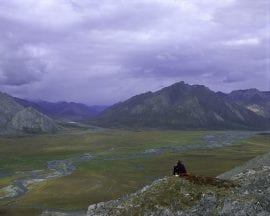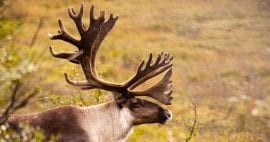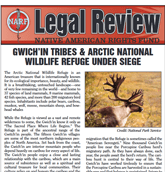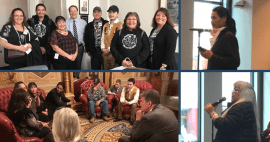
The Native American Rights Fund (NARF) proudly represents the Native Village of Venetie Tribal Government, Arctic Village Council, and Venetie Village Council at this stage of their long struggle to protect the Arctic National Wildlife Refuge. On June 1, 2021, the U.S. Department of Interior released a statement announcing a pause on oil and gas development in the Refuge while the department conducts a new Environmental Impact Statement.
Background
The breathtaking and one-of-a-kind Arctic National Wildlife Refuge is part of the ancestral range of the Gwich’in people and key to their survival. For them, the refuge’s Coastal Plain is Iizhik Gwats’an Gwandaii Goodlit (The Sacred Place Where Life Begins).
Teaming with beauty and life, the refuge ecosystem supports 37 species of land mammals, 8 marine mammals, 42 fish species, and more than 200 migratory bird species. The refuge provides the calving grounds for the Porcupine Caribou herd. Gwich’in culture honors the caribou and these ancestral homelands that have provided for them for thousands of years.

The Gwich’in people have developed a close and lasting spiritual relationship with the caribou, which they depend upon as a main source of subsistence and cornerstone of their culture. The Gwich’in have maintained a sacred relationship to the land and the caribou as part of their culture, identity, and integrity as the indigenous inhabitants of the area.
“From the beginning of time, we’ve depended on caribou for our way of life. We take care of the caribou, and in return, they take care of us. The coastal plain is the heart of the Arctic National Wildlife Refuge, not only for caribou, but for many other animals who are born there and raise their young there because it’s a safe place away from predators. It should be kept that way because there’s no other place they can go to,” said elder spokesperson for Native Village of Venetie Tribal Government Sarah James. “It is the core of the caribou existence and Gwich’in existence.”
For more than 40 years, citizens of the globe have joined the Gwich’in in fighting to prevent the oil and gas industry from gaining access to resources under the pristine landscape. Oil and gas development would alter the arctic ecosystem and the ability of the caribou to reproduce and survive. The damage would impact the land, the caribou, and the Gwich’in people who have stewarded this pristine landscape and healthy ecosystem for thousands of years.
Case Updates
June 2021: DOI Pauses Oil and Gas Development in the Refuge
On June 1, 2021, the U.S. Department of Interior released a statement announcing a pause on oil and gas development in the Refuge while the department conducted a new environmental impact statement. To comply with an Executive Order by President Biden, the Department conducted a review to determine if the Interior Department had followed regulations and policies in its decision making under the previous administration. The statement explained the review found that the Interior Department had failed to conduct sufficient analysis of environmental impacts to the Refuge and misinterpreted the Tax Act in its decision to auction oil and gas leases to land in the Refuge on Jan. 6, 2021.
January 20, 2021: President Biden Imposes Temporary Moratorium
Through an executive order, U.S. President Joe Biden imposed a temporary moratorium halting oil and gas leasing of the Arctic National Wildlife Refuge on Jan. 20, 2021. During the pause, the U.S. Secretary of Interior Deb Haaland (Laguna Pueblo) reviewed if Department of Interior staff followed regulations and policies to arrive at their decision to auction fossil fuel development leases in the Refuge. With the immediate threat of further Refuge leasing temporarily removed, NARF and the three Gwich’in tribes work with the Biden administration in developing protective measures that ensure the future of the Refuge is secured.
January 2021: Trump Administration Auctions Oil and Gas Leases in the Refuge
U.S. District Judge Sharon Gleason denied NARF’s request for a preliminary injunction. On January 6, 2021, the Trump administration auctioned oil and gas leases on 11 tracts of land within the refuge. The State of Alaska’s economic development corporation purchased nine of the leases and half of the proceeds from the auction of all 11 tracts benefit the state.
December 2020: Tribes Seek to Stop Seismic Exploration and Leasing in the Refuge
On December 15, 2020, the Native Village of Venetie Tribal Government, Arctic Village Council, and Venetie Village Council, represented by NARF and Bessenyey & Van Tuyn, LLC, sought a temporary restraining order and a preliminary injunction prohibiting the Trump Administration from approving seismic exploration and issuing oil and gas leases in the Arctic National Wildlife Refuge’s Coastal Plain. The Tribes are plaintiffs in Native Village of Venetie Tribal Government v. Bernhardt in the United States District Court for the District of Alaska (3:20-cv-0022230-SLG). An injunction is necessary to stop imminent injury to lands the Gwich’in Tribes hold sacred.
The filing cited documentation showing that seismic surveying activities cause irreparable damage to the Coastal Plain landscape and ecosystem. It noted the large-scale and intensive seismic exploration activities proposed to begin in January 2021 would likely cause irreparable harm to the Tribes, the Coastal Plain, caribou and other wildlife, as well as tribal archaeological and cultural resources.
The filing noted the lease sale scheduled for January 6, 2021, would also likely cause irreparable harm. Unlike typical oil and gas leases, the Coastal Plain leases would guarantee lessees rights-of-way and easements across areas outside their lease tract boundaries, resulting in irreparable harm across vast swaths of the Coastal Plain. The defendants proposed to make essentially the entire 1.5 million acres of the Coastal Plain available. Courts have recognized the irreparable harm flowing from the issuance of these types of leases and granted preliminary injunctions to prevent oil and gas lease sales and maintain the status quo pending the outcome of litigation.
“Throughout this politicized review process, this administration ignored both the rights of the Tribes and the popular call nationwide to keep this incredible region protected. The Coastal Plain is the cornerstone of Gwich’in culture and the Tribes refer to it as: “Iizhik Gwats’an Gwandaii Goodlit,” the “Sacred Place Where Life Begins.” With this blatant attempt to offer up the Coastal Plain in less than thirty days and in the midst of a global pandemic and ongoing litigation, the administration continues to ignore tribal rights, public interests, and the basic tenets of law,” said NARF Staff Attorney Matthew Newman.
September 2020: Tribes sue to Protect the Refuge
In September 2020, NARF brought suit to protect the refuge on behalf of the three federally recognized Gwich’in tribes working tirelessly to protect their way of life and oppose oil and gas development in the Arctic National Wildlife Refuge. The Native Village of Venetie Tribal Government, Arctic Village Council, and Venetie Village Council filed the lawsuit against Secretary of the Interior David Bernhardt to protect the Coastal Plain of the Arctic National Wildlife Refuge from oil and gas development.
The lawsuit represented the latest effort in a decades long fight by the Tribes to protect the Coastal Plain, a region of incredible cultural and religious significance to the Tribes and their people. “The cultural identity of the Gwich’in people as caribou people is intertwined with the Porcupine Caribou Herd’s calving areas in the Coastal Plain. Any impacts to the Porcupine Caribou Herd from changes in migration patterns, lower fertility rates, and loss of habitat will have significant adverse social, cultural, spiritual, and subsistence impacts on our people,” said Native Village of Venetie Tribal Government First Chief Margorie Gemmill. “This process must be stopped. As tribal governments we will defend the rights of our people at all costs.”
Fifteen state governments, led by the State of Washington’s Attorney General Bob Ferguson, stood alongside the Tribes today by filing a separate lawsuit to preserve this national treasure and protect their states’ interests in combating climate change and protecting migratory birds. “As tribal governments, we have a responsibility to our citizens to defend this sacred place. I am thankful we are joined in this effort by other state governments who likewise share this duty of responsibility to their people. Together, we will protect this sacred place. Not only for the Neets’ąįį Gwich’in, but for all Americans,” said First Chief Galen Gilbert of the Arctic Village Council.
August 2020: Trump Administration Approves Oil and Gas Development in the Refuge
On August 17, 2020, Secretary of the Interior David Bernhardt signed the record of decision approving oil and gas development in the Arctic National Wildlife Refuge’s Coastal Plain. This approval represents the latest move by the Trump Administration to rapidly develop lands significant to the Neets’ąįį Gwich’in Tribes. The Native Village of Venetie Tribal Government, Arctic Village Council, and Venetie Village Council (collectively “the Tribes”) are unequivocally opposed to development in the Coastal Plain and will continue to fight to protect the Coastal Plain and their way of life.
The U.S. Department of Interior’s approval of the Coastal Plain Oil and Gas Leasing Program came at a time when the Tribes were working tirelessly to protect the health and well-being of their communities from the increasing threats of climate change and the spread of COVID-19. The decision forced the Tribes to choose between devoting limited time and resources to protect their communities during the global pandemic, or to protect their way of life from the catastrophic effects of fossil fuel development in the Coastal Plain.
“The Coastal Plain is one of the most important natural, cultural, and subsistence resources to the Neets’ąįį Gwich’in of Arctic Village and Venetie and to the Gwich’in people as a whole,” said Gemmill. “The cultural identity of the Gwich’in people as caribou people is intertwined with the Porcupine Caribou Herd’s calving areas in the Coastal Plain. Any impacts to the Porcupine Caribou Herd from changes in migration patterns, lower fertility rates, and loss of habitat will have significant adverse social, cultural, spiritual, and subsistence impacts on our people. This process must be stopped. We call on all our allies to join the Gwich’in in opposing this attack on our way of life.”
June 2019: NARF Legal Review Features the Ongoing Fight to Protect Gwich’in Homelands

The NARF Legal Review is published semi-annually and provides updates on NARF’s cases and information on other timely Indian law topics. The Winter/Spring 2019 edition describes efforts to protect the Arctic National Wildlife Refuge.
February 2019: Tribal Representative Testify in DC
In February 2019, eight tribal representatives testified in DC about the importance of protecting the Arctic National Wildlife Refuge. The tribal delegation met with members of Congress, Administration officials, and joined together with allies at demonstrations supporting protections of the Coastal Plain.

February 2019: Trump Administration Releases Inadequate Environmental Impact Statement
In December, the Bureau of Land Management (BLM) released a slap-dash Environmental Impact Statement knowingly based on inaccurate, outdated, and incomplete information. The BLM scheduled all of the required public hearings (seven in Alaska and one in DC) to happen in a greatly foreshortened schedule between February 5 and February 13.
The public hearings consisted of a presentation by the BLM, followed by a court reporter meeting privately with attendees to record their comments. This uncommon procedure diminished the force of testimony and deflated public discourse, not allowing regulators to hear from the people in favor of completing public comment quickly and quietly.
December 2018: BLM Releases Draft Environmental Impact Statement
The Bureau of Land Management today released the draft Environmental Impact Statement for oil and gas development in the Arctic National Wildlife Refuge. This release represents the latest move by the Trump Administration to rapidly develop public lands significant to the region’s federally recognized Neets’ąįį Gwich’in Tribes.
“Today’s release was done with no prior notification to our Tribal Councils, who have met with the BLM for months on a government-to-government basis,” said Native Village of Venetie Tribal Government Executive Director Tonya Garnett. “What’s even more disrespectful is to release this just before our villages are gathering together to celebrate the holidays. The total lack of regard to our tribal governments on an issue of such importance really demonstrates how BLM leadership views their trust responsibility to our Tribes. Our people and the caribou are bound together, and their fate is the same as ours. We will never stop in the defense of our way of life.”
With the help of Alaska Senator Lisa Murkowski, the oil and gas industry inserted a provision into the Tax Cuts and Jobs Act of 2017 allowing the Arctic National Wildlife Refuge to be opened to oil and gas development. Oil and gas asked, Senator Murkowski provided. The Trump administration strived to approve oil and gas leases before the next presidential election, pushing processes that usually take years, through in mere months.
In less than a year, the Trump Administration slapped together an Environmental Impact Statement, based on pre-existing data and research from other regions in Alaska. The draft EIS brushed aside the subsistence and cultural resources of the local Tribes. Under the law, an EIS must consider all potential impacts on the environment and local communities, which the draft EIS did not do. For example, it did not include an adequate analysis of the effects on the Porcupine Caribou Herd, which calves on the Refuge’s coastal plain, or the Gwich’in Tribes who depend on the herd; the analysis failed to include knowledge from the Native people most intimately familiar with the region; and, in comparing outcomes for alternative scenarios, it did not even consider the option of NOT opening the Coastal Plain to leasing.
The draft boldly declared that oil and gas development in the caribou calving grounds would have no impact on the Tribe’s subsistence hunting practices. Even as it acknowledged that oil and gas development could change migration patterns and lower calving rates, it’s narrow and incomplete analysis incorrectly concluded that Gwich’in subsistence use would not be affected.
Next Steps
Please join the Native Village of Venetie Tribal Government, Venetie Village Council, and Artic Village Council as they work to protect the Arctic National Wildlife Refuge. Your donation will support tribes as they fight for justice.

As a nonprofit legal organization, NARF asserts and defends the rights of Indian tribes, organizations, and individuals nationwide. Your donation allows us to protect tribal natural resources like the Arctic Wildlife National Refuge and to preserve tribal existence for tribes like the three Gwich’in Tribes working to protect the Porcupine Caribou and The Sacred Place Where Life Begins. To keep current on this legal battle and other NARF cases, please subscribe to our newsletter.
More Cases

